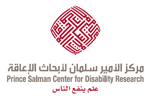History and Services
In honor of his Royal Highness Prince Salman bin Abdulaziz Al Saud, the late Saudi Arabian Defense Minister, former governor of Riyadh, the Prince Salman Disability Research (PSCDR) was funded by his Highness Prince Sultan bin Salman bin Abdulaziz Al Saud in 1990 to complement the Disabled Children’s Association (DCA).
It was established to complement the needs of disabled persons outside the scope of DCA. Following overwhelming support and undeterred commitment from its founding members, PSCDR achieved independence from DCA to further expand its research pursue ground breaking research and champion programs that benefit people living with disabilities and their families. In spite of the brief existence, PSCDR continues to positively impact the disability landscape in Saudi Arabia.
PSCDR’s vision is to be recognized center of excellence of disability research with global impact. To fulfill this vision, PSCDR seriously took its role as a provider of service, operating proactively to define and fulfill the needs of the public in efficient manner.
Mission
The mission of the PSCDR is to prevent disabilities and improve the quality of life of the disabled. To accomplish this mission, PSCDR developed strategies, initiative and program that effectively address many of the common problems facing the disabled community. To guide this work, PSCDR committed to adhere to the following core values:
-
Pursuing knowledge that benefits mankind.
-
Team-building and the sharing of knowledge and resources.
-
Promoting a culture of integrity, professionalism and compassion.
Directed by its vision and mission, PSCDR’s research priorities and programs were dictated by need assessment and developed in consultation with stake-holders coupled with strong academic and training agenda. The PSCDR has made tremendous strides in maximizing return of research results to provide essential support and services for the disabled community.
Facilities and Initiatives
Despite increased global awareness, efforts to promote equality, and push towards greater sensitivity and social correctness regarding disability issues, persons living with disabilities continue to suffer from discrimination throughout the world. To help overcome disparities in today’s society, PSCDR promotes constructive engagement and policy dialogue to demonstrate that reform can lead to mutual benefits.
A number of diseases lead to disability if left untreated. Without proper medical care and rehabilitation services, minor disabilities can evolve into acute and severe disabilities that become difficult to manage. Other forms of disabilities can be prevented through screening programs; these include premarital screening, pre-implantation genetic diagnosis, and newborn screening.
Advances in technology offer great promise in the care and management of disabling diseases. PSCDR sponsors research programs that investigate the efficacy of routine and advances treatment modalities to cure disabling diseases. They have systematic approach and responsibilities among the directors, executive committee members and executives in the administration. Following are their prime working pattern.
-
Determine the Center’s Mission and Purpose.
-
Hire the Center Director as one of the major responsibilities.
-
Effective Organizational Planning.
-
Determine and Monitor the Center’s Program.
-
Mobilizing Resources.
-
Management of Financial Resources.
-
Performance is assessed on a periodic basis.
-
Effective Board Practices through ongoing board education and orientation.
The Prince Salman Center for Disability Research deserves the Hamdan Award for Best Medical Institution/Centre in the Arab world in recognition of its pioneering work in disability research, promoting and efforts to promote equality, and push towards greater sensitivity and social correctness regarding disability issues, persons living with disabilities over the years and for its research programmes.

